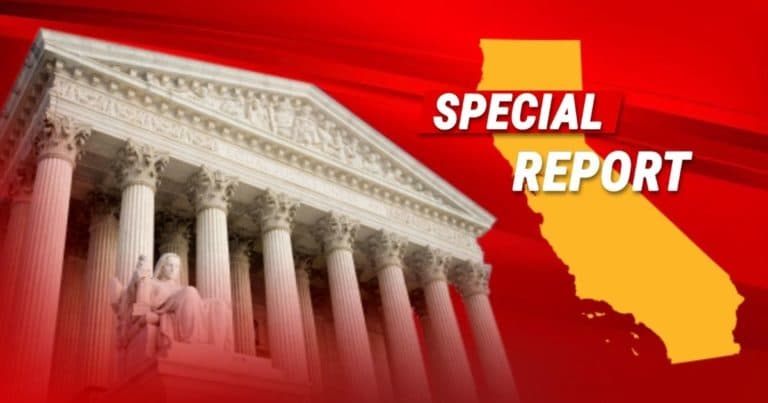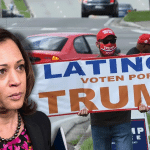
In recent years, Democrats have taken a more aggressive stance against the First Amendment, pushing to restrict what they deem as harmful or misleading speech. From college campuses to social media platforms, many on the left have advocated for curbing free expression in the name of combating disinformation.
Critics argue that these efforts have gone too far, effectively undermining one of the core principles of American democracy—free speech. The trend shows no signs of slowing, and new laws aimed at curbing speech seem to pop up regularly.
One of the most striking examples of this battle against free expression came out of California, where a recently passed law sought to crack down on AI-generated content. Governor Gavin Newsom, reacting to an AI-generated parody targeting Vice President Kamala Harris, pushed through legislation aimed at censoring “materially deceptive” AI content.
The move was framed as a defense against disinformation, but it quickly came under fire for being a blatant violation of the First Amendment.
From The Post Millennial:
A California law signed by Governor Gavin Newsom late last month that was in direct reaction to his disgust at AI parodies of his friend Vice President Kamala Harris has been struck down after US District Judge John A. Mendez ruled that it was in violation of the First Amendment. The Plaintiff in the case has been granted a preliminary injunction, stopping the law from going into effect while the case goes forward.
California’s AI Censorship Law Struck Down
California’s latest attempt to regulate AI content has hit a wall. The controversial law, signed by Newsom in response to a viral AI parody of Kamala Harris, has been blocked by a federal judge. U.S. District Judge John A. Mendez ruled that the law violated the First Amendment, granting an injunction to stop it from going into effect.
The law was meant to prohibit AI or deepfakes deemed “materially deceptive” concerning elections, but Judge Mendez found it to be an overly broad and unconstitutional restriction on free speech.
Mendez’s ruling hit the nail on the head, criticizing the law for using a “hammer instead of a scalpel.” It didn’t just aim at genuinely harmful content; it broadly targeted any AI-generated political speech, including satire and parody.
The ruling comes after YouTuber Christopher Kohls, who shared the parody video of Harris, sued the state for violating his constitutional rights. The court agreed, with Mendez noting that Kohls was likely to win the case on First Amendment grounds.
The Viral Ad That Sparked the Law
The law was born out of a viral moment. Over the summer, an AI-generated fake campaign ad for the Harris-Walz ticket exploded on social media. In the parody, a fake Kamala Harris boasted about being the first DEI (Diversity, Equity, and Inclusion) candidate on a presidential ticket. The video was obviously satirical, but it struck a nerve with Newsom, who called it manipulative and vowed to make such content illegal.
Enter Elon Musk. After Newsom’s public outcry, Musk—never one to shy away from controversy—shared the parody video, adding fuel to the fire. Musk’s sharing of the video brought the issue to a wider audience, amassing over 100 million views on X (formerly Twitter). Newsom’s response?
Sign a bill that would effectively ban such content, even if it was clearly satirical. But the courts saw it differently, blocking the law as unconstitutional and protecting the right to free speech—even in the digital age of AI.
Judge’s Ruling: Free Speech Prevails
Judge Mendez didn’t mince words in his ruling. He declared that the law failed to pass constitutional muster, especially since it didn’t use the “least restrictive means” to achieve its goal.
Instead of outright censorship, Mendez suggested that the state could combat bad speech with more speech—a longstanding principle of free expression in the United States. He emphasized that political speech, especially when critical of the government, must remain protected.
The ruling also pointed out that the law didn’t require actual harm to be proven before AI-generated content could be punished. This, the judge argued, was a fundamental flaw.
The law sought to restrict speech based on the potential for harm, which is far too broad a standard when it comes to free expression. As Mendez eloquently put it, “Counter speech is the tried and true buffer and elixir, not speech restriction.”
Free Speech Wins in the Digital Age
Elon Musk, ever the champion of free speech, had the last word—at least for now. After the court’s decision, Musk took to X once more to celebrate the ruling. “California’s unconstitutional law infringing on your freedom of speech has been blocked by the court. Yay!” he posted, in classic Musk fashion.
It was a victory not just for Musk but for anyone concerned about the creeping tide of censorship, especially in the digital age where AI-generated content is becoming more common.
Journalist Michael Shellenberger also weighed in, applauding the ruling for standing up to censorship under the guise of regulating technology. Shellenberger highlighted a key part of the ruling, which stated that the core principles of the First Amendment don’t change just because technology evolves. Whether it’s a pamphlet from the 18th century or a deepfake from the 21st, free speech must remain protected.
A Blow to Censorship Advocates
The striking down of California’s AI censorship law serves as a reminder: free speech is a fundamental right, even when it makes people uncomfortable. The First Amendment protects not only polite discourse but also criticism, parody, and satire—whether delivered by a town crier or through AI. For now, it seems, the courts remain a steadfast defender of these principles.
As technology continues to evolve, so too will the battles over speech and censorship. But as Judge Mendez’s ruling shows, no matter how advanced our digital tools become, the solution to bad speech is not to silence it, but to let it be answered by more voices.
Key Takeaways:
- Democrats have increasingly pushed for limits on free speech, raising concerns about First Amendment violations.
- A California law attempting to ban AI-generated political content was recently blocked by a federal judge for being overly broad and unconstitutional.
- The ruling emphasized that even in the digital age, political satire and parody are protected under the First Amendment.
Source: The Post Millennial


